Join the European Studies Center to UNC to learn about graduate studies abroad at Trans-Atlantic University. Contact slund@pitt.edu for more information.
Thursday, November 2nd, 2017 to Saturday, November 4th, 2017
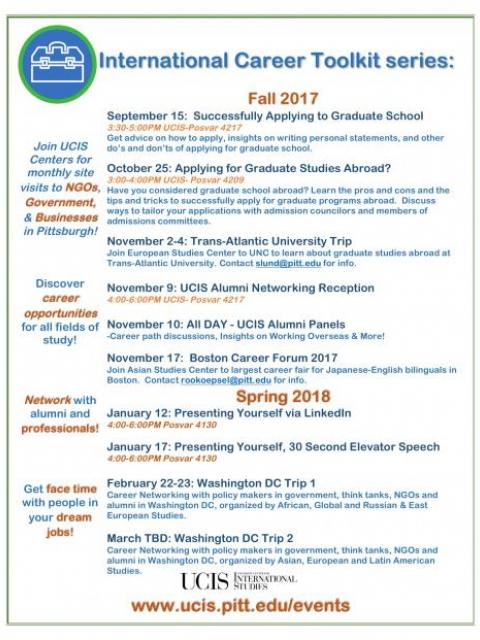
Monday, October 30th, 2017
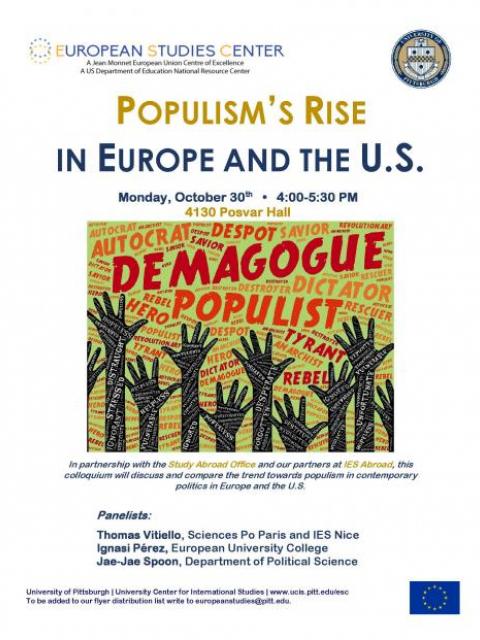
In partnership with the Study Abroad Office and our partners at IES Abroad, this colloquium will discuss and compare the trend towards populism in contemporary politics in Europe and the U.S.
Friday, October 27th, 2017
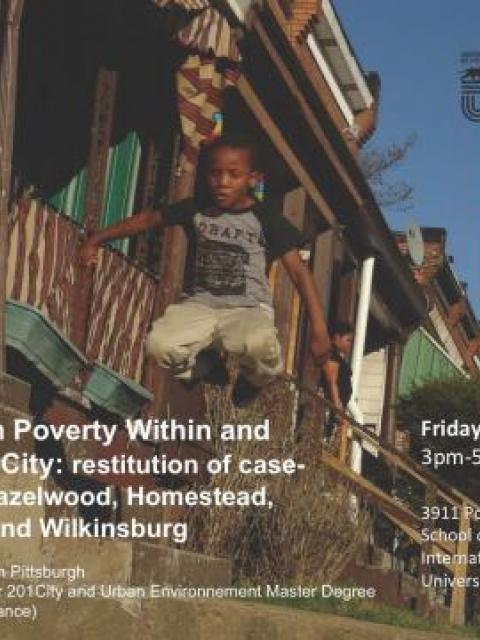
Altervilles Study Trip in Pittsburgh
21st-28th of October 201City and Urban Environnement Master Degree
University of Lyon (France)
Part of the Pitt-Université Jean Monet-Université de Lyon partnership.
Economic great powers export domestic regulatory policies and force the costs of adjustment onto foreign firms and governments. Such arguments about market power regularly examine economic great powers in isolation and, thus, have less to say about a world governed increasingly by economic multipolarity. In their paper, Dr. Newman and his associates argue that a great power’s ability to force foreign actors into adjusting is not only conditioned by their relative economic clout but also by the political institutions that govern their markets. Specifically, they expect that where states choose to draw their jurisdictional boundaries directly shapes a polity’s global influence. When a polity expands its jurisdiction, harmonizing rules across otherwise distinct sub-national, or national markets, it can curtail a rival’s authority. They test the theory by assessing foreign firm delisting decisions from US stock markets after the adoption of the Sarbanes-Oxley accounting legislation. The Act, which included an exogenous, extraterritorial shock, follows the harmonization of stock market governance across various European jurisdictions. Econometric analysis of firm-level data illustrates that EU-based companies, which benefited from jurisdictional expansion, were substantially more likely to leave the American market and avoid adjustment pressures. Their findings contribute to debates on extraterritorial governance and authority in a transnational economy, highlight the critical role played by institutions in economic statecraft, nuance arguments about Europe as an international actor and provide evidence in favor of more relational theorizing in International Relations that examines the nexus of market access, political authority and compliance.
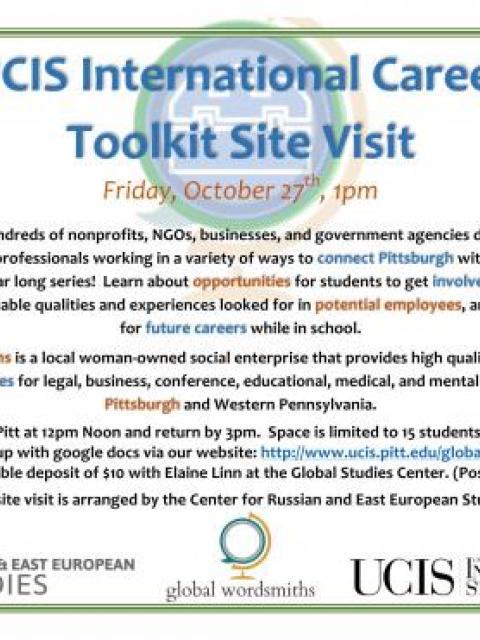
Pittsburgh has hundreds of nonprofits, NGOs, businesses, and government agencies doing international work! Meet with professionals working in a variety of ways to connect Pittsburgh with the world during the UCIS year long series! Learn about opportunities for students to get involved with local organizations, valuable qualities and experiences looked for in potential employees, and ways to prepare for future careers while in school. Global Wordsmiths is a local, woman-owned social enterprise that provides high quality, low-to-no-cost translation services for legal, business, conference, educational, medical and mental health settings in Pittsburgh and Western Pennsylvania.
We will depart Pitt at 12 Noon and return by 3 PM.Space is limited to 15 students so reserve your space today! Sign up with google docs via our website: http://www.ucis.pitt.edu/global/toolkit, and leave a refundable deposit of $10 with Elaine Linn at the Global Studies Center (Posvar 4100). This site visit is arranged by the Center for Russian and East European Studies.
Wednesday, October 25th, 2017
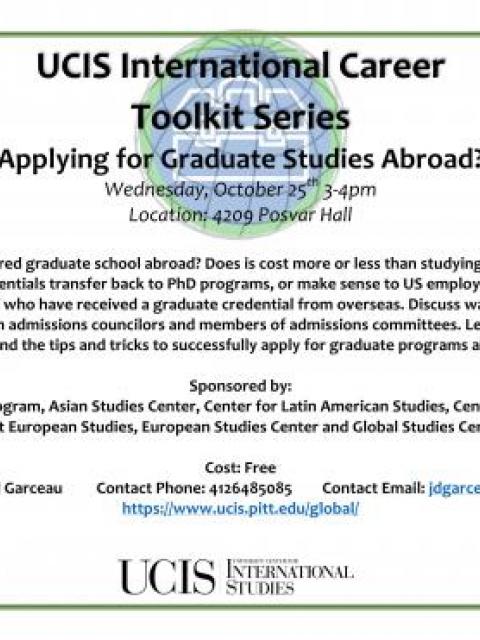
Have you considered graduate school abroad? Does is cost more or less than studying in the USA? How does the overseas credential transfer back to PhD programs, or make sense to US employers? Hear directly from Pitt alumni who have received a graduate credential from overseas. Discuss ways to tailor your applications with admissions councilors and members of admissions committees. Learn the pros and cons and the tips and tricks to successfully apply for graduate programs abroad.
Saturday, October 21st, 2017
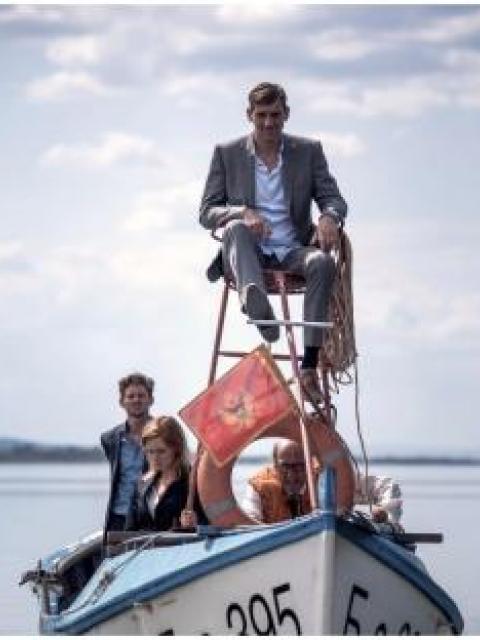
The King of the Belgians (94 minutes)
The King of the Belgians is on a state visit in Istanbul when his country falls apart. He must return home at once to save his kingdom. But a solar storm causes airspace and communications to shut down. No planes. No phones. With the help of a British filmmaker and a troupe of Bulgarian folk singers, the King and his entourage manage to escape over the border. Incognito. Thus begins an odyssey across the Balkans during which the King discovers the real world - and his true self.
Trailer: https://www.youtube.com/watch?v=DJa5C0_CqQI
Discussion of the film (10 minutes)
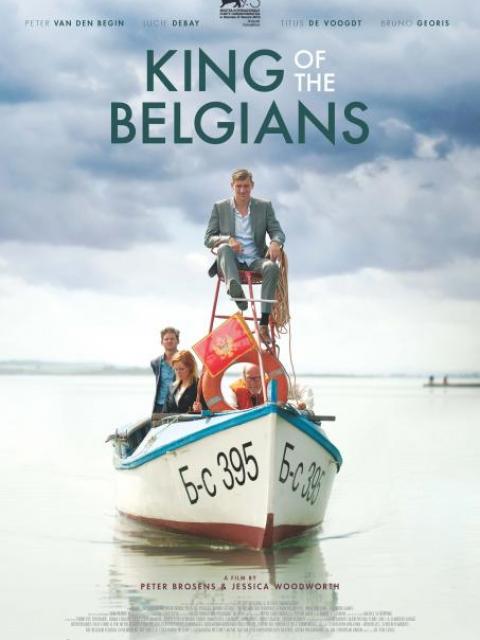
As part of the International Week film series on the theme of 'Displacement', the European Studies Center is proud to bring you the Pittsburgh premiere of the Cannes Film Festival acclaimed 'King of the Belgians'.
Trailer: http://www.kingof.be/#trailer
KING OF THE BELGIANS is a road movie in which a dormant King gets lost in the Balkans and awakens to the real world. Desperate to return home from a state visit to Istanbul when his country suffers its worst-ever political crisis, but unable to fly due to a solar storm, the King of the Belgians finds himself on a tumultuous road trip across the Balkans.
For questions, please contact adelnore@pitt.edu.
Friday, October 20th, 2017
Please join the International Week Committee and University Center for International Studies for the opening reception of the Displacement(s) film series. Refreshments will be provided prior to the first films in the series beginning at 6pm.
Wednesday, October 18th, 2017
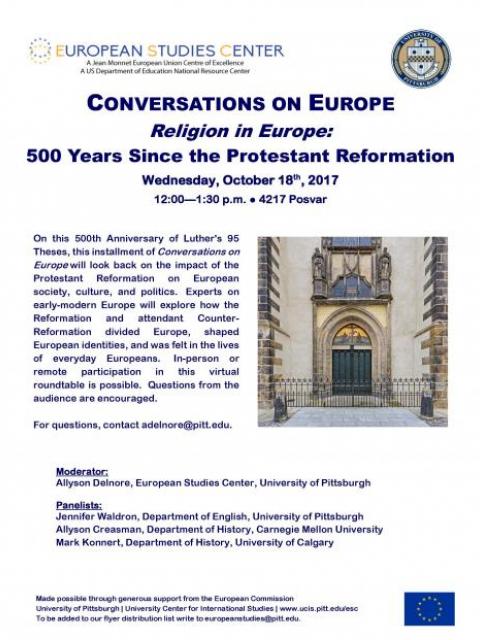
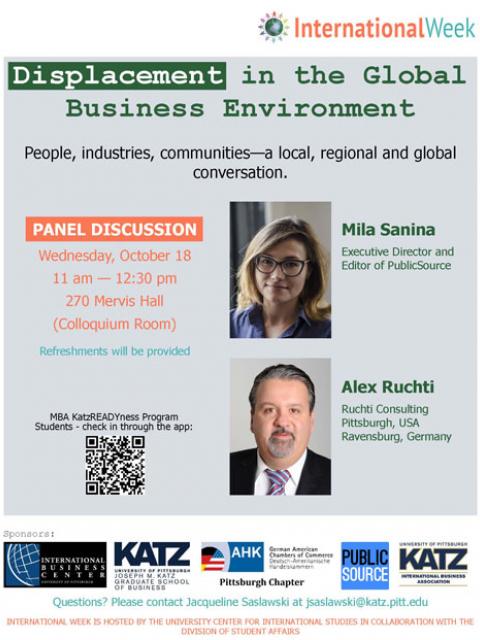
This interactive panel will discuss how displacement has affected employees and industries locally and globally. It will cover reasons for displacement and how different industries, regions, or countries tackle these issues.
Friday, October 13th, 2017
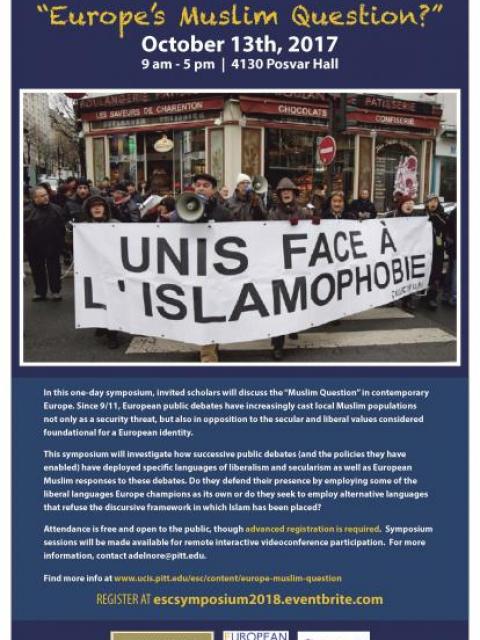
In this one-day symposium, invited scholars will discuss Europe’s contemporary “Muslim crisis” from a twofold approach: First, how successive public debates and the policies they have enabled have deployed specific languages of liberalism and secularism. Second, how have European Muslims responded to the discursive and conceptual terrain of Europe’s Islam debate and the political environment it creates. Do they defend their presence by employing some of the liberal languages Europe champions as its own or do they seek to employ alternative languages that refuse the discursive framework in which Islam has been placed? And in these different responses, what roles do creative forms of expression, such as cinema, music, or literature play? Faculty organizer: Jeanette Jouili, Department of Religious Studies. Attendance is free and open to the public, though advanced registration is required. Symposium sessions will also be live-streamed.
To register, go to https://escsymposium2018.eventbrite.com.
To view the conference program, visit http://www.ucis.pitt.edu/esc/content/europe-muslim-question .
Sponsored by the European Studies Center with additional thanks to the Consortium for Educational Resources on Islamic Studies (CERIS)
For more information, contact adelnore@pitt.edu.
Thursday, October 12th, 2017
This Graduate Student Workshop follows on the previous day's lecture on Culture and Security. Master's and Ph.D. students in GSPIA, History, and Political Science researching security issues are especially welcome. Participants will explore the emerging interdisciplinary field of culture and security studies through a set of readings distributed in advance and will discuss research projects. To sign up, please contact Zsuzsánna Magdó, Assistant Director for Partnerships and Programs.
Wednesday, October 11th, 2017
Security studies have given surprisingly little attention to cultural diversity as a constituent factor in the overall dynamics of security management. A case in point is that securitization theory still refers to cultural differences mainly as a source for conflict and therefore as an object of securitization. So far, cultural codes, linguistic barriers, and processes of self-identification did not constitute an important aspect of analysis. Culture as a value based concept and as a group marker, however, is not per se a primary source of conflict. Rather, culture appears as a symbol over and through which security concerns are articulated. Therefore, in multi-cultural societies cultural affiliation plays a crucial role in pre-structuring audiences and security agendas.
Addressing this emerging field of interdisciplinary security studies, this lecture is a lead-up to a day-long Graduate Student Workshop on Thursday, October 12. While the workshop is especially intended to Master's and Ph.D. students in GSPIA, History, and Political Science, all are welcome. To sign up, please contact Zsuzsánna Magdó, Assistant Director for Partnerships and Programs by September 29.
Since 2007, Peter Haslinger has been the Director of the Herder Institut for Historical Research on East-Central Europe in Marburg, Professor of East-Central European History at the Historical Institute of the Justus Liebig University and the Interdisciplinary Center for Eastern Europe in Gießen (GiZo). His research and teaching focuses on forced migrations and expulsions; the minority question; nationalism, regionalism, language policies; memory, museification, and the politics of history; security and violence studies; the spatial turn and the history of cartography; and the history of discourse and scientific communication. For a list of publications and awards, see https://www.herder-institut.de/en/institute-staff/staff/personen/ansehen....
This lecture is part of the REES Fall Series: Eastern Europe in the World.
Thursday, October 5th, 2017
Few historians have asked about 'development' as an idea unfolding within one specific historical space and representing three big socioeconomic regimes: capitalism, developing/post-colonial economy and socialism. Witnessing transformation of Poland from a supply hinterland of Western Europe (and a space of economic exploitation under Nazi rule), into a modernizing socialist nation-state, Polish economists studied these socio-economic systems comparatively and in a world perspective. But what is even more interesting, they also understood all three of them as overlapping and following each other in their own country's recent past and present. What lessons did Polish social scientists try to convey from this experience to the post-colonial world and how may their contributions change our understanding of history of international development?
Malgorzata Mazurek specializes in modern history of Poland and East Central Europe. Her interests include twentieth-century social sciences, international development, social history of communism and Polish-Jewish relations. Her lecture is based on a new book project that deals with the intellectual history of East Central European involvement in the making of the non-Western world between the late 19th century and 1960s. Dr. Mazurek is part of Socialism Goes Global, an international research project housed at the University of Exeter and funded by the British Arts and Humanities Council, http://socialismgoesglobal.exeter.ac.uk/. Dr. Mazurek's previous book, Society in Waiting Lines: On Experiences of Shortages in Postwar Poland (Warsaw: Trio 2010), has been shortlisted among the ten best books in contemporary Polish history in a 2011 nationwide contest. She is also the author of several articles on comparative and transnational history of labor and consumption in twentieth-century Poland.
This lecture is part of the REES Fall Series: Eastern Europe in the World.
Tuesday, October 3rd, 2017
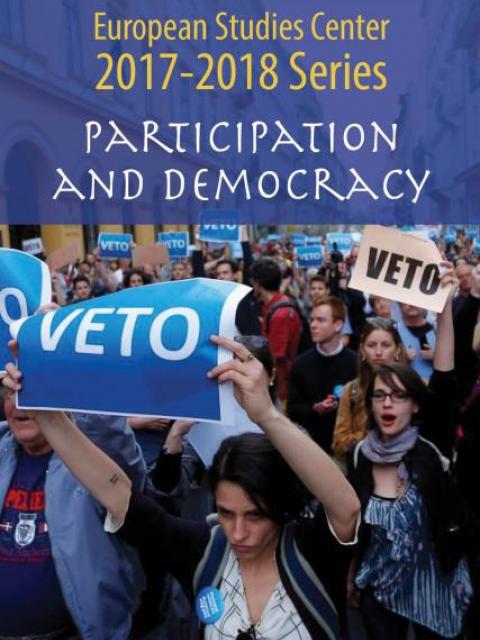
The federal elections in Germany will be held on September 24, 2017. In this lecture we will take a look back on the German election campaign and try to explain the outcome of the election. Which topics did the parties highlight in their campaigns? What campaigning trends did we see in the 2017 German election? Which strategies did the candidates and the parties use to sell themselves to the voters and did their campaigns matter? How did the far-right do in the German election? Besides that, we will also discuss the ongoing coalition formation processes and the efforts of the German parties to now form a government after the election. Finally, we analyze what the result of the German election means for the European power play and Germany’s foreign policy towards their European neighbors as well as the US.
This lecture is part of German Campus Week and the ESC's Participation and Democracy Series.
Monday, September 25th, 2017
In the post-Crimea international arena, the Russian-speaking populations outside of the Russian Federation have once again become a central focus of journalistic enquiries and political analysis. Loyalties and identities of Russophones in Ukraine and Kazakhstan, where they are numerically the largest, and in Latvia and Estonia, where they make proportionally large share of the population, are under scrutiny. The lecture will focus on the conflictual interplay of regional security and stability strategies, Russia’s nation-building efforts and the questions of Russophone minority protection in post-Soviet space 25 years after the dissolution of USSR.
Kristina Kallas is the Director of Narva College at the University of Tartu. Her research and teaching focuses on nationalism studies, minority and fundamental rights, integration processes in multicultural societies, integration and migration policies, refugees and asylum seekers. Since 2015, she also heads the Supervisory Board of the Estonian Integration Foundation. Previously, she has been Senior Analyst at the Institute of Baltic Studies and Member of the Board for the Estonian Refugee Council.
This lecture is part of the REES Fall Series: Eastern Europe in the World.
Saturday, September 23rd, 2017
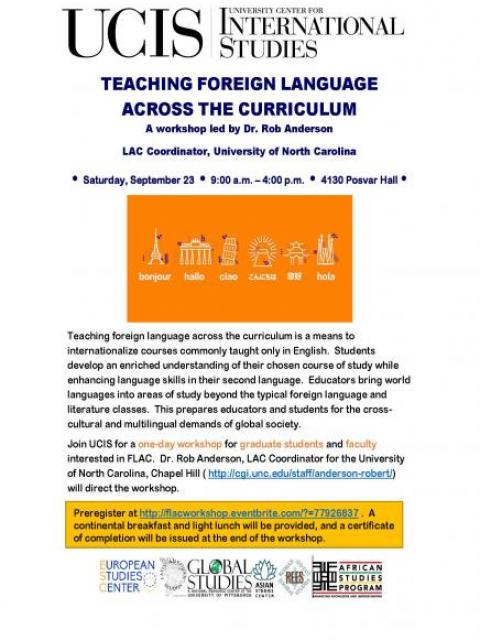
Teaching foreign language across the curriculum is a means to internationalize courses commonly taught only in English. Students develop an enriched understanding of their chosen course of study while enhancing language skills in their second language. Educators bring world languages into areas of study beyond the typical foreign language and literature classes. This prepares educators and students for the cross-cultural and multilingual demands of global society.
Join UCIS for a one-day workshop for graduate students and faculty interested in teaching FLAC. Dr. Rob Anderson, LAC Coordinator from the University of North Carolina, Chapel Hill will direct the workshop. A continental breakfast and lunch will be provided.
There is no cost to attend the event, but pre-registration is required. Pre-register at http://flacworkshop.eventbrite.com/?s=77926837
Friday, September 22nd, 2017
The nineteenth century saw the explosion of questions: the Eastern, social, Jewish, Polish, worker and many other questions were hotly discussed in representative bodies, at treaty negotiations, and above all in the daily press. Over the course of the next century, these would be conglomerated into still bigger ones—the European, nationality, social, and agrarian questions—even as they fractured into countless smaller ones, like the Macedonian and Schleswig-Holstein questions, and made their way into various fields of human endeavor (there was cotton, oyster, and even a sugar question). What brought about the “age of questions,” and what does its trajectory reveal about Eastern Europe in the twentieth-century world?
Holly Case is a historian of modern Europe whose work focuses on the relationship between foreign policy, social policy, science, and literature in the European state system of the nineteenth and twentieth centuries. Her first book, Between States: The Transylvanian Question and the European Idea during WWII, was published in May 2009. The book shows how the struggle for mastery among Europe’s Great Powers was affected by the perspectives of small states. Her lecture at the University of Pittsburgh is based on her current brook project that deals with the history of the “Age of Questions.” Case has written on European history, literature, politics and ideas for various magazines and newspapers, including The Guardian, The Chronicle Review, The Nation, Dissent, The Times Literary Supplement, and Boston Review, and is a regular columnist for 3 Quarks Daily.
This lecture is part of the REES Fall Series: Eastern Europe in the World.
Wednesday, September 20th, 2017
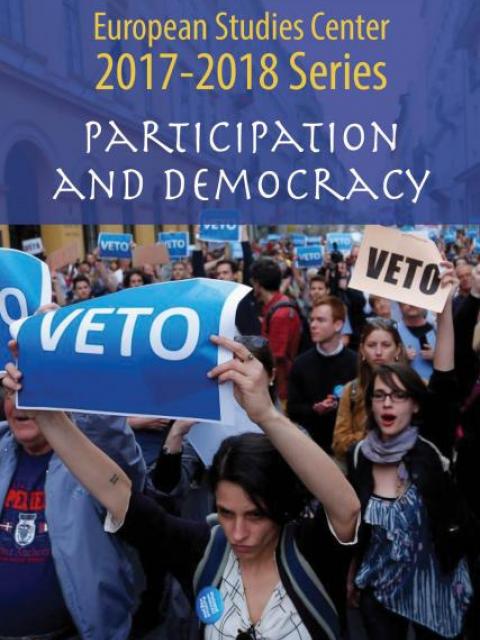
Part of German Campus Week and the ESC's Participation and Democracy series for 2017-18.
Panelists:
Annika Schechinger, Deputy Director of the Information Center USA, German Embassy
Tarik Abou-Chadi, Postdoctoral Researcher and Lecturer, Department of Social and Political Sciences, Humboldt-University Berlin
Mark Kayser, Professor of Applied Methods and Comparative Politics, Hertie School of Governance, Berlin
Gregor Thum, Associate Professor, Department of History, University of Pittsburgh
Moderator:
Jae-Jae Spoon, Director, European Studies Center and Associate Professor, Department of Political Science, University of Pittsburgh
Tuesday, September 19th, 2017
The presentation will cover:
- Introduction to the German American Chamber of Commerce.
- The importance of learning German.
- German business development in the U.S.
- The presence of German companies throughout the U.S.
- How to approach German companies in the U.S. for career opportunities.
- Understanding cultural differences between the U.S. and Germany.
- Success stories among young Americans, who have pursued German.
- Business German – an important tool for international career development.
- Comparison between the German and American educational systems.
Please register at www.gaccpit.com.
Free admission.
Friday, September 15th, 2017
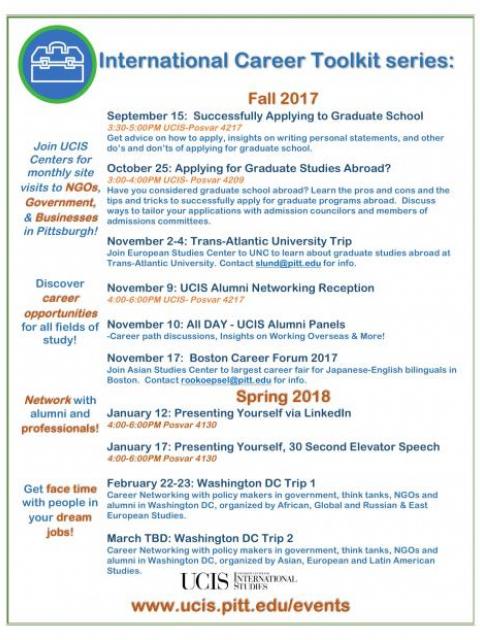
Get advice on how to apply, insights on writing and tailoring personal statements, and other do's and don'ts of applying for graduate school.
With speakers:
Michael Rizzi
Director of Student Services
Graduate School of Public and International Affairs
University of Pittsburgh
David Fortna
Associate Director of Admissions
Heinz College
Carnegie Mellon University
Kelly Urban
Visiting Lecturer
Department of History
University of Pittsburgh
Emily Rook-Koepsel
Assistant Director for Academic Affairs
UCIS Asian Studies Center
University of Pittsburgh
Meme Jeffries
Director of Financial Aid
School of Law
University of Pittsburgh
Thursday, September 14th, 2017
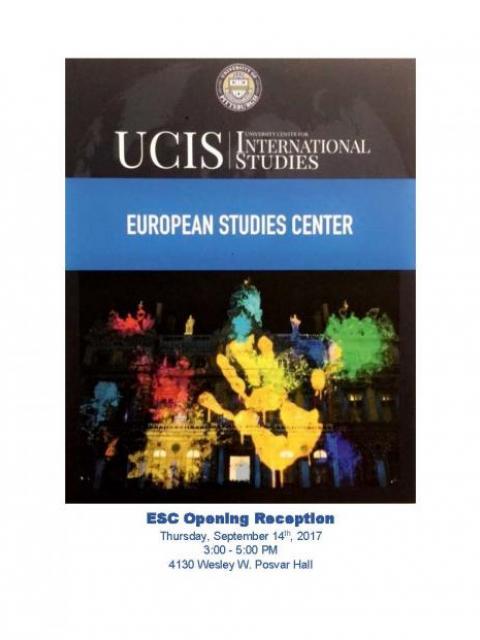
The staff of the European Studies Center invites you to attend a reception to usher in the 2017-18 academic year. All interested faculty, staff, students, alumni, and members of the ESC community are welcome to attend. Refreshments will be served.
Wednesday, September 13th, 2017
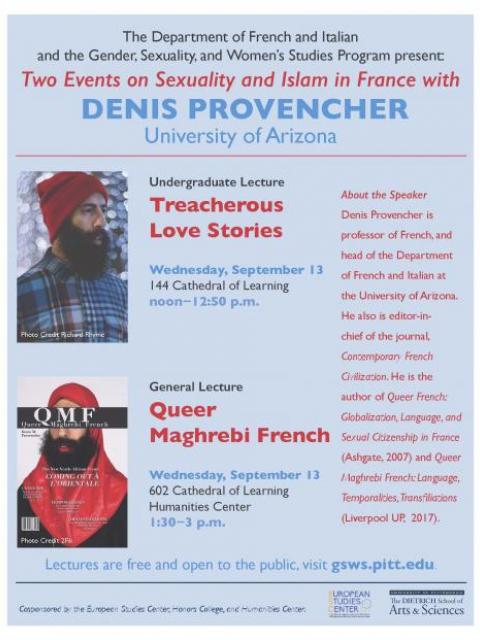
Professor Provencher's general lecture will draw from his forthcoming book Queer Maghrebi French, which investigates the lives and stories of queer Maghrebi and Maghrebi French men who moved to or grew up in contemporary France. It combines original French language data from ethnographic fieldwork in Paris, Lyon, and Marseille with a wide array of recent narratives and cultural productions including performance art and photography, films, novels, autobiographies, published letters, and other first-person essays to investigate how these queer men living in France and the diaspora stake claims to time and space, construct kinship, and imagine their own future. By closely examining empirical evidence from the lived experiences of queer Maghrebi French-speaking performance artists, religious thinkers, novelists, and directors, as well as “everyday” (i.e., “non-artistic or non-creative”) study participants, this book presents a variety of paths available to these men who articulate and pioneer their own sexual difference within their families of origin and contemporary French society.
Abstract for undergraduate lecture: Treachery? Treason? What exactly are these and how do they get woven together with love and romance in a context like the course here at Pitt called “French Kiss?” Not that anything French has anything to do with love, n’est-ce pas? Or does it? Are “all things French” related to kissing, romance, and love stories? Or can they turn treacherous when it involves strangers or enemies? This presentation is somewhat about a hook-up where the Frenchman sleeps with his (German) enemy during WW2 or perhaps with his North-African (Muslim) enemy in the post-9/11 or post-Charlie Hebdo attack era. Good French sexual citizens who collude, fall into bed with, and perhaps fall in love with their post-colonial counterparts. Treacherous love stories filled with trickery, exploitation, and even terrorism.
Friday, September 8th, 2017 to Sunday, September 10th, 2017
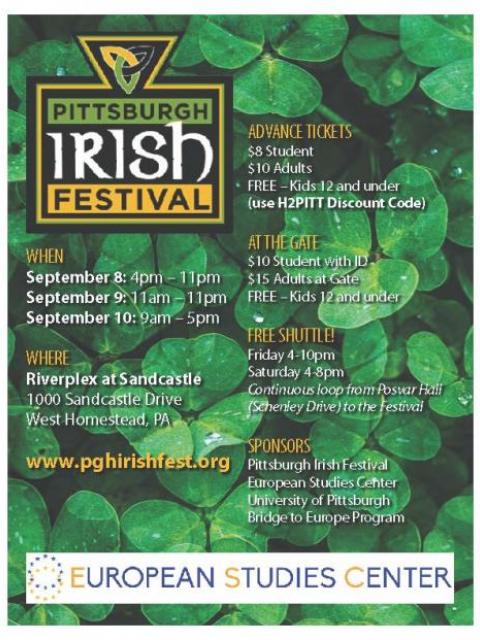
The European Studies Center has partnered with the Pittsburgh Irish Festival. We are pleased to be able to offer discounted admission to all Pitt students, faculty, and staff. Just go to pghirishfest.org and use the promo code H2PITT to receive $2 of discounted advance tickets. A FREE shuttle will take Pitt students to and from the festival grounds! The shuttle will run from 4:00 pm to 10:00 pm Friday, and 4:00 pm to 8:00 pm Saturday. Board outside Posvar Hall on Schenley Drive.
We've partnered with Irish Festival organizers and will feature three presentations at the Hedge School stage:
• Friday’s Hedge School 6:00-6:30: Nic Barilar, Ph.D. Candidate, Theatre and Performance Studies
Title: Irish Theatre at Home... and the Diaspora: The Curious Case of the 1957 Dublin Theatre Festival
Summary: “In 1957, the Dublin Theatre Festival was postponed - indefinitely. The festival was to feature new plays by some of Ireland's literary giants: Sean O'Casey, Samuel Beckett, an adaptation of James Joyce's novel ULYSSES. What led to the Festival's cancellation and what became of these plays? Join Nic Barilar, a PhD student at the University of Pittsburgh’s Theatre and Performance Studies Department, to find out…”
• Saturday’s Hedge School 6:30-7:00: Dr. Janice Vance, School of Health and Rehabilitation Sciences, University of Pittsburgh
Summary: “Since 2006, over 260 undergraduate students from the School of Health and Rehabilitation have studied in Ireland on the SHRS in Ireland Study Abroad Program. Dr. Janice Vance, a native of Belfast, directs the program which involves visits to multiple schools, clinics, hospitals and support organizations in Belfast and Dublin. The focus of the program is on the development of inter-professional insights in health and rehabilitation within contexts were the students can also learn about the influence of economic, political and social factors on policy and practice. Dr. Vance will reflect on the challenges and rewards of developing this pre-professional learning experience and the unique opportunities offered in Ireland.”
• Sunday’s Hedge School 3:00-3:30: Dr. Paul S. Adams, Department of Political Science, University of Pittsburgh at Greensburg
Summary: "Dr. Adams has led two Pitt study abroad courses to Ireland and Northern Ireland that focus on the development of the Irish state and the Troubles of Northern Ireland from the late 1960s to the 1990s. Dr. Adams' research and interests lie in the power-sharing arrangement that came about through the Good Friday Agreement of 1997 and brought peace to Northern Ireland. His presentation will focus on the current conditions in Northern Ireland and the unique opportunities Pitt students have had in their visits to Belfast that relate to the Troubles."
Wednesday, September 6th, 2017
Despite incentives to present a unified front during elections, political parties are often rife with disagreements and differences in priorities. Yet, little is known about how parties negotiate between conflicting factions and intra-party groups. In this project, Dr. Greene considers competing perspectives that explain parties’ decision-making process. Do divided parties use campaign materials such as election platforms to detail carefully negotiated compromises or instead minimize policy disagreements by excluding discussion of these issues? Using evidence from Germany, Dr. Greene considers these perspectives by examining the content of speeches and election platforms from parties’ most important decision-making forum: the party national congress. The results suggest that different logics hold depending on the importance of the issue at hand.
Thursday, August 10th, 2017
Dr. Blanco Sío-López, one of the 2017 ESC and ULS Summer Research Scholars, will be presenting an update on her research in Pitt’s Barbara Sloan EU Depository Collection. Dr. Blanco Sío-López is conducting research on her project entitled “Navigating Schengen: Historical Challenges and Potentialities of the EU’s Free Movement of Persons from European to Global Governance, 1985 to the present.”
The Summer Research Scholars Program is a joint initiative by the ESC and the University Library System to award travel grants to two scholars per year working on topics relevant to European integration and for whom access to the unique archival collections housed at the University of Pittsburgh would prove beneficial.
Sunday, June 18th, 2017 to Saturday, June 24th, 2017
This week-long study tour for educators is meant to increase participants' knowledge of the European Union, its institutions and decision-making process, and its influence in Europe and around the world.
Wednesday, May 3rd, 2017
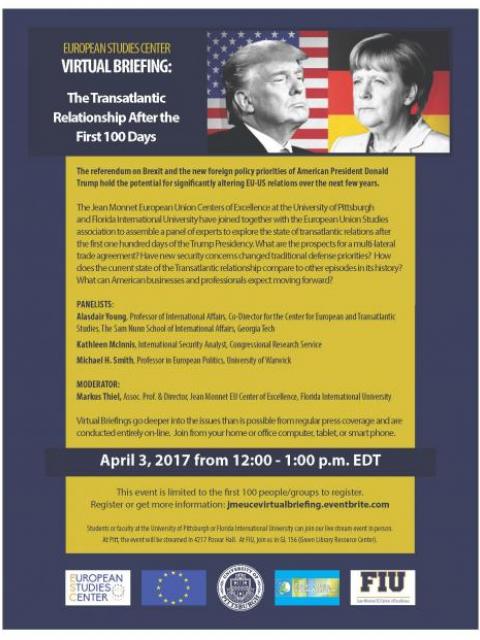
The referendum on Brexit and the new foreign policy priorities of American President Donald Trump hold the potential for significantly altering EU-US relations over the next few years.
The Jean Monnet European Union Centers of Excellence at the University of Pittsburgh and Florida International University have joined together with the European Union Studies association to assemble a panel of experts to explore the state of transatlantic relations after the first one hundred days of the Trump Presidency. What are the prospects for a multi-lateral trade agreement? Have new security concerns changed traditional defense priorities? How does the current stage of the Transatlantic relationship compare to other episodes in its history? What can American businesses and professionals expect moving forward?
Confirmed panelists:
Dr. Alasdair Young, Professor of International Affairs, Co-Director for the Center for European and Transatlantic Studies, The Sam Nunn School of International Affairs, Georgia Tech
Dr. Kathleen McInnis, International Security Analyst, Congressional Research Service
Dr. Michael Smith, Chair in International Relations, University of Aberdeen
Moderator:
Dr. Markus Thiel, Associate Professor and Director of the Jean Monnet EU Center of Excellence, Florida International University
Go deeper into the issues than is possible from regular press coverage. This virtual briefing will provide not only a detailed analysis of transatlantic trade and security prospects, but also some context for understanding this particular moment and what is at stake moving forward. The panel will be conducted entirely on-line. You are invited to join from your home or office computer, tablet, or smart phone.
This event is limited to the first 100 people/groups to register. To register or for more information, go to https://www.eventbrite.com/e/jmeuce-virtual-briefing-the-transatlantic-r....
Students or faculty at the University of Pittsburgh or Florida International University can join our live stream event in person. At Pitt, the event will be streamed in 4217 Posvar Hall. At FIU, join us in GL 156 (Green Library Resource Center).
Friday, April 28th, 2017
Saturday, April 22nd, 2017
Friday, April 21st, 2017
International Career Toolkit Series will be hosting an event this Friday at 12:00-1:30 p.m. in WWPH 4217. Usha E. Pitts will be giving a talk entitled "Careers in Diplomacy". The U.S. Department of State is one of the few employers who will pay you to live and work abroad without requiring a specialized skill. It hires Americans over the age of 20 from all walks of life. If you are attracted to public service and want to live abroad, come learn more about Careers in Diplomacy from Usha Pitts, a diplomat with 19 years in the Foreign Service. She will give you tips on preparing for an international career and taking the Foreign Service Officer Test (FSOT). She will also tell you how to use your language skills to work abroad with the Consular Fellows Program (now hiring speakers of Spanish, Portuguese, Russian, Mandarin, and Arabic). See more information at careers.state.gov, or come to an information session.
Usha Pitts has also provided additional information from the Department of State and for the event at http://tinyurl.com/mdxgcxg . You can also follow updates at @DOSCareers and facebook.com/DIRNYMetro.
Friday, April 14th, 2017
Join us in celebrating the publication of Irina Livezeanu’s "The Routledge History of East Central Europe since 1700"!
Tuesday, April 11th, 2017
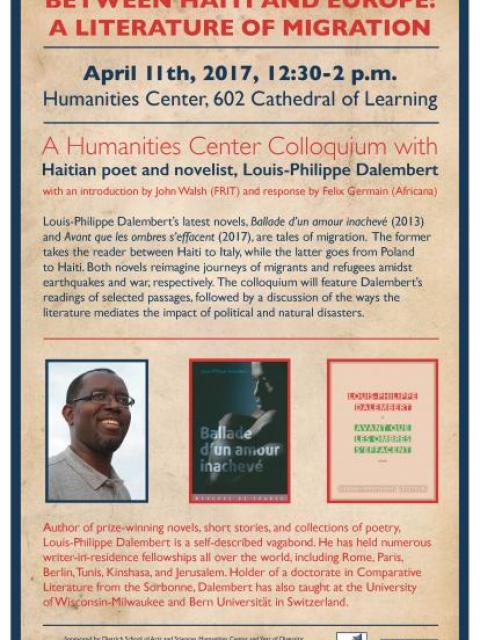
Humanities Center Colloquium with
Haitian poet and novelist, Louis-Philippe Dalembert
with an introduction by John Walsh (FRIT) and response by Felix Germain (Africana)
Sponsored by: Dietrich School of Arts and Sciences, Humanities Center and Year of Diversity;
University Honors College; European Studies Center; Center for Latin American Studies;
Departments of French & Italian and Africana Studies
Louis-Philippe Dalembert’s latest novels, Ballade d’un amour inachevé (2013)
and Avant que les ombres s’effacent (2017), are tales of migration. The former
takes the reader between Haiti to Italy, while the latter goes from Poland
to Haiti. Both novels reimagine journeys of migrants and refugees amidst
earthquakes and war, respectively. The colloquium will feature Dalembert’s
readings of selected passages, followed by a discussion of the ways the
literature mediates the impact of political and natural disasters.
Author of prize-winning novels, short stories, and collections of poetry,
Louis-Philippe Dalembert is a self-described vagabond. He has held numerous
writer-in-residence fellowships all over the world, including Rome, Paris,
Berlin, Tunis, Kinshasa, and Jerusalem. Holder of a doctorate in Comparative
Literature from the Sorbonne, Dalembert has also taught at the University
of Wisconsin-Milwaukee and Bern Universität in Switzerland
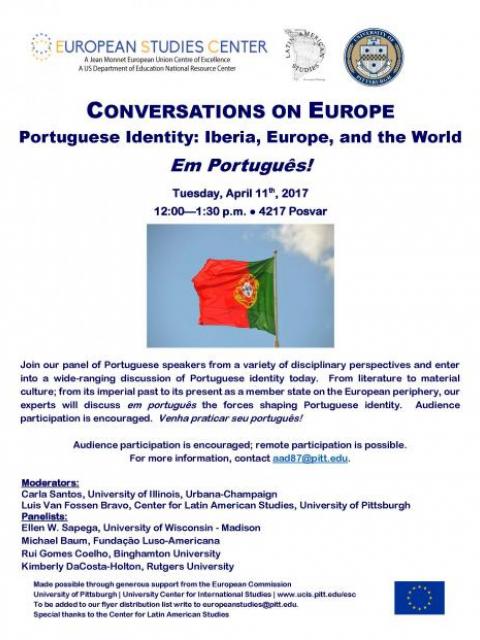
Saturday, April 8th, 2017
A family friendly festival featuring all things Europe in the ‘Burgh. Local artisans and vendors will create a dynamic marketplace and performances of song and dance will be presented on the main stage. Food booths featuring various European cuisines will be participating and artistic demonstrations and children’s activities will take place throughout the day.
Friday, April 7th, 2017
The Undergraduate Research Symposium (formerly "Europe: East and West") is an annual event since 2002 designed to provide undergraduate students, from the University of Pittsburgh and other colleges and universities, with advanced research experiences and opportunities to develop presentation skills. The event is open to undergraduates from all majors and institutions who have written a research paper from a social science, humanities, or business perspective focusing on the study of Eastern, Western, or Central Europe, the European Union, Russia, or other countries of the former Soviet Union. Selected participants are grouped into panels according to their research topics and will give 10- to 15-minute presentations to a panel of faculty and graduate students. Presentations are open to the public.
Thursday, March 30th, 2017 to Friday, April 21st, 2017
Announced by the Department of French & Italian and the European Studies Center:
Opening night of the 2017 Italian Film Festival USA of Pittsburgh is almost here! Don't miss the blockbuster hit Like Crazy on March 30, at 7 p.m. at the Frick Fine Arts Auditorium, located at on the campus of the University of Pittsburgh.
Free Admission.
All films shown in original language with English subtitles.
Sponsored by the Italian Cultural Institute of New York City, Heinz History Center Italian American Collection, University of Pittsburgh Film studies, and the Dante Alighieri Society of Pittsburgh. In collaboration with the University of Pittsburgh.
For film descriptions, see www.italianfilmfests.org.
Thursday, March 30th, 2017 to Saturday, April 1st, 2017
Students, faculty, and the public are welcome to attend the keynote address and the panels. View the Conference program (http://www.ucis.pitt.edu/esc/system/files/resources/documents/2017-jm-ma...) for information about the panel topics, times and locations.
Marriage equality movements in advanced industrialized democracies have been remarkably successful in achieving policy change. From 2001 to 2016, marriage equality has been achieved in nearly two dozen states. Since many of these victories occurred in Europe, North America, and Oceania, it is timely to organize a conference in which scholars and participants can explore how marriage equality is impacting the future of LGBTQ rights. The pathways to marriage equality have been incredibly varied, including legislation, litigation, and referendums. Moreover, marriage equality has been achieved across a broad range of institutional climates, from parliamentary to presidential systems and from federal to unitary states. The increasingly transnational networks of activists working to advance marriage equality may have contributed to the policy diffusion of marriage equality. Despite the extension of marriage equality, the LGBTQ community continues to experience discrimination and harassment, and in some states, legal protections regarding non-discrimination, parenting, or gender recognition are inadequate.
The faculty research workshop on marriage equality in advanced industrialized democracies will be held from March 30th to April 1st, 2017, at the University of Pittsburgh. This international conference is organized by Professor Helma de Vries-Jordan, in collaboration with colleagues from the University of Pittsburgh’s Graduate School of Public and International Affairs, the Kenneth P. Dietrich School of Arts and Sciences, and the School of Law, under the leadership of the European Studies Center and Jean Monnet European Union Centre of Excellence. The workshop integrates social movements scholarship concerning marriage equality, other LGBTQ rights, and gender equality, placing them in comparative and international perspective. The conference will bring together some of the leading scholars in this field, presenting papers and engaging in dialogue about future directions for scholarship, with the goal of promoting collaborations between scholars and interactions amongst conference participants which will include faculty, students, and community members.
The conference will examine the factors that have influenced marriage equality movements and relevant LGBTQ rights policy-making, both in states with marriage equality and in states with ongoing campaigns. Causal factors that may be explored include dynamics in the political opportunity structure, identity-based versus strategic framing of issues, diffusion of norms regarding LGBTQ rights, and networking of activists. We will explore a number of central debates regarding the impact of marriage equality on the future of LGBTQ rights and regarding the transnational social movements working to advance gender and sexual equality. Questions will include: How has marriage equality impacted or been influenced by progress on other LGBTQ rights issues, or has marriage equality contributed to backlash or delays in achieving other rights? How have marriage equality movements’ level of inclusiveness regarding sexual and gender minorities impacted their advocacy and post-marriage equality policy outcomes? Finally, how portable are the strategies, frames, resources, and networks of activists across borders, and how has cooperation or conflict between activists across borders influenced these movements?
Monday, March 27th, 2017
This workshop on global human trafficking for regional college faculty and students is presented by the international and area studies programs of the University Center for International Studies (UCIS), University of Pittsburgh. Light refreshments will be provided. This event is part of an annual series of curriculum development workshops connected with the US Department of Education-sponsored Title VI National Resource Center project to internationalize 2-year and 4-year college campuses throughout Western Pennsylvania.
Pre-registration is required to attend this event. Please register by March 22 at https://goo.gl/forms/n7gWbKAK1zppYjmx1.
Thursday, March 23rd, 2017
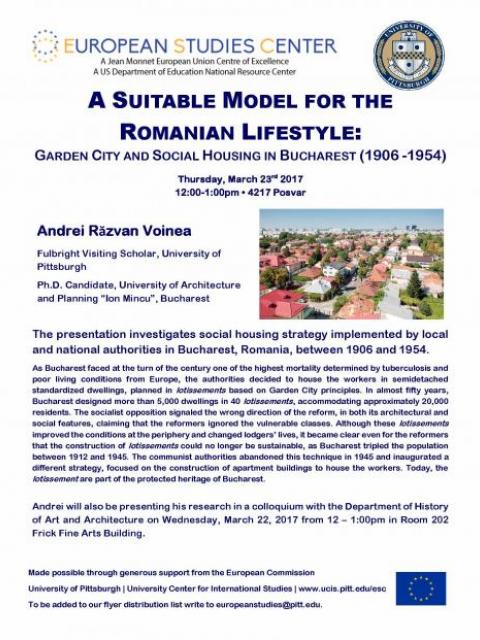
The presentation investigates social housing strategy implemented by local and national authorities in Bucharest, Romania, between 1906 and 1954. As Bucharest faced at the turn of the century one of the highest mortality determined by tuberculosis and poor living conditions from Europe, the authorities decided to house the workers in semidetached standardized dwellings, planned in lotissements based on Garden City principles. In almost fifty years, Bucharest designed more than 5,000 dwellings in 40 lotissements, accommodating approximately 20,000 residents. The socialist opposition signaled the wrong direction of the reform, in both its architectural and social features, claiming that the reformers ignored the vulnerable classes. Although these lotissements improved the conditions at the periphery and changed lodgers’ lives, it became clear even for the reformers that the construction of lotissements could no longer be sustainable, as Bucharest tripled the population between 1912 and 1945. The communist authorities abandoned this technique in 1945 and inaugurated a different strategy, focused on the construction of apartment buildings to house the workers. Today, the lotissement are part of the protected heritage of Bucharest.
Andrei will also be presenting his research in a colloquium with the Department of History of Art and Architecture on Wednesday, March 22, 2017 from 12 – 1:00pm in Room 202 Frick Fine Arts Building.
Wednesday, March 22nd, 2017
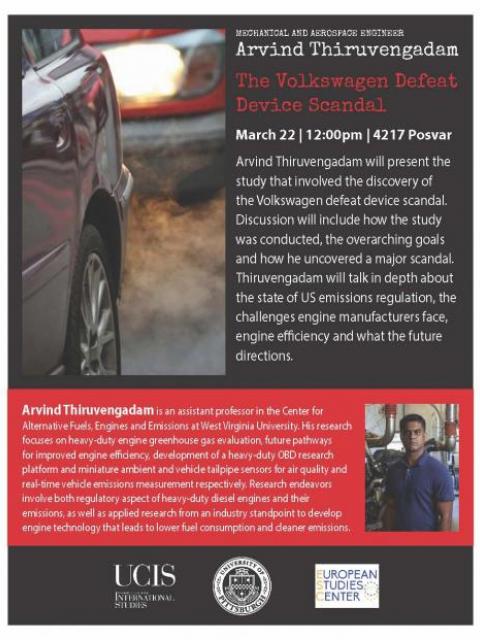
Arvind Thiruvengadam will present the study that involved the discovery of the Volkswagen defeat device scandal. Discussion will include how the study was conducted, the overarching goals and how he uncovered a major scandal. Thiruvengadam will talk in depth about the state of US emissions regulation, the challenges engine manufacturers face, engine efficiency and what the future directions.
Arvind Thiruvengadam is an assistant professor in the Center for Alternative Fuels, Engines and Emissions at West Virginia University. His research
focuses on heavy-duty engine greenhouse gas evaluation, future pathways for improved engine efficiency, development of a heavy-duty OBD research platform and miniature ambient and vehicle tailpipe sensors for air quality and real-time vehicle emissions measurement respectively. Research endeavors involve both regulatory aspect of heavy-duty diesel engines and their emissions, as well as applied research from an industry standpoint to develop engine technology that leads to lower fuel consumption and cleaner emissions.
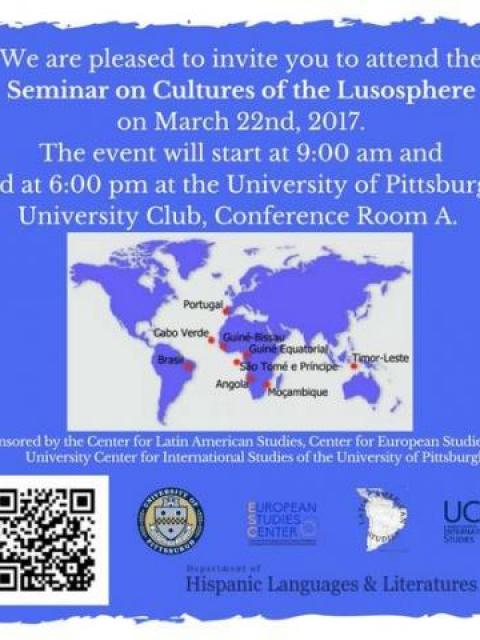
This seminar aims to explore the cultural diversity of the Lusosphere. It provides a platform for educators, students, researchers, academics, and professionals to share their insights and practices as well as discuss current trends, concerns, and experiences in the areas of language, literature, culture, and education. The goal is to set up an environment where not only specialists can share the results of their research, but where undergraduate/graduate students have the chance to share their ideas about cultural practices, products, and perspectives in Portuguese. From a variety of perspectives, we intend to incorporate new avenues, new theoretical and methodological paradigms, and new advancements in the areas of language, literature, culture, and education. The seminar objects to provide an opportunity to communicate their informed views and suggestions to an audience seeking to gain new insights into the cultures of the Luso Sphere.
Tuesday, March 21st, 2017
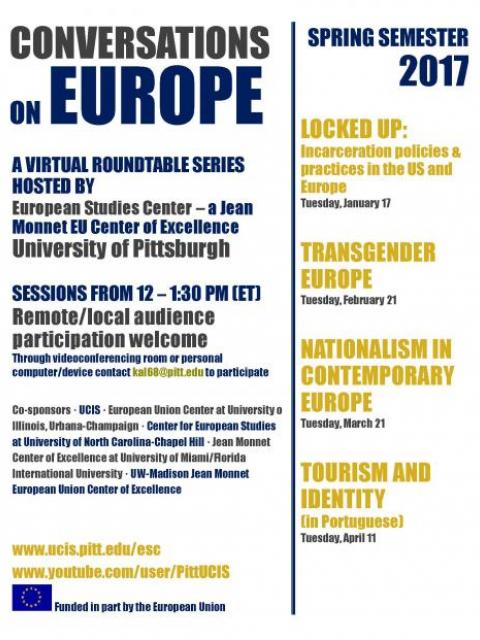
Monday, March 20th, 2017
Leila Marouane, author of "The Sexual Life of an Islamist in Paris"
2-3:30 pm
Reading and Q&A with Leila Marouane
3:45-5 pm
Roundtable Discussion "What to do with French in 2017?"
Free and open to the public
Organized by the Department of French & Italian
Sunday, March 19th, 2017
12th Annual Graduate Student Conference on the European Union
March 17-18, 2017
Graduate students from around the world are invited to participate in the conference and present papers on topics related to the larger theme of “Toward a New EU” Organizers will invite presenters from the Faculty Research Conference to comment on the students’ papers. This will be an excellent chance for young scholars to present their work in a professional setting and to network with more senior scholars. The Graduate Student Conference is funded in part by a Jean Monnet Project Grant from the European Union with co-sponsorship from the Jean Monnet Center of Excellence at the University of Denver and the European Union Center at the University of North Carolina at Chapel Hill.
Ground transportation from Pittsburgh International Airport to Oakland:
28X Airport Flyer – Port Authority Bus
$2.75 exact change (about 1 hour 15 minutes, depending on traffic)
Super Shuttle – Shared Ride Van (PIT to/from Wyndham Hotel)
$48.00 roundtrip
Uber/Lyft
About $35 one-way (depending on traffic)
Taxi/Z-Trip
Between $45 and $60 one-way (depending on traffic)
View the Conference program (subject to change).
LOCATION: Pittsburgh Athletic Association, 4215 Fifth Avenue, Pittsburgh, PA 15213
(view map)
Saturday, March 18th, 2017
12th Annual Graduate Student Conference on the European Union
March 17-18, 2017
Graduate students from around the world are invited to participate in the conference and present papers on topics related to the larger theme of “Toward a New EU” Organizers will invite presenters from the Faculty Research Conference to comment on the students’ papers. This will be an excellent chance for young scholars to present their work in a professional setting and to network with more senior scholars. The Graduate Student Conference is funded in part by a Jean Monnet Project Grant from the European Union with co-sponsorship from the Jean Monnet Center of Excellence at the University of Denver and the European Union Center at the University of North Carolina at Chapel Hill.
Ground transportation from Pittsburgh International Airport to Oakland:
28X Airport Flyer – Port Authority Bus
$2.75 exact change (about 1 hour 15 minutes, depending on traffic)
Super Shuttle – Shared Ride Van (PIT to/from Wyndham Hotel)
$48.00 roundtrip
Uber/Lyft
About $35 one-way (depending on traffic)
Taxi/Z-Trip
Between $45 and $60 one-way (depending on traffic)
View the Conference program (subject to change).
LOCATION: Pittsburgh Athletic Association, 4215 Fifth Avenue, Pittsburgh, PA 15213
(view map)
Friday, March 17th, 2017

Interested in global public health issues? Join us as we hear from Sarah Angel Markwardt and Miriam (Mimi) Frisch from Magee Womancare International and Partners in Health respectively.
Miriam (Mimi) Frisch is originally from Buffalo, New York. Mimi graduated from University of Pittsburgh in 2015 with a Bachelors of Philosophy in International and Area Studies focused on global health and urban studies with a minor in economics. Her thesis focused on socio-demographic risk factors on dengue fever incidence in Buenos Aires. Previously, Mimi spent one year working in Rwanda as a Global Health Corps fellow, where she worked for the Rwandan Ministry of Health as the Nutrition Program Monitoring and Evaluation Officer in Burera District. She provided programmatic support to the Burera District nutrition program, and analyzed all nutrition data for the district, providing feedback and guidelines to health centers to improve nutrition education and malnutrition monitoring. Her work was recognized by UNICEF and was presented as a potential model for implementation across Rwanda. Currently, Mimi works for Partners in Health in Liberia, as the Staff Operations Officer in Maryland County, where she is responsible for building and managing systems and staff to improve efficiency and delivery of operational services of the organization. In her free time, Mimi enjoys traveling, cooking, eating and running.
12th Annual Graduate Student Conference on the European Union
March 17-18, 2017
Graduate students from around the world are invited to participate in the conference and present papers on topics related to the larger theme of “Toward a New EU” Organizers will invite presenters from the Faculty Research Conference to comment on the students’ papers. This will be an excellent chance for young scholars to present their work in a professional setting and to network with more senior scholars. The Graduate Student Conference is funded in part by a Jean Monnet Project Grant from the European Union with co-sponsorship from the Jean Monnet Center of Excellence at the University of Denver and the European Union Center at the University of North Carolina at Chapel Hill.
Ground transportation from Pittsburgh International Airport to Oakland:
28X Airport Flyer – Port Authority Bus
$2.75 exact change (about 1 hour 15 minutes, depending on traffic)
Super Shuttle – Shared Ride Van (PIT to/from Wyndham Hotel)
$48.00 roundtrip
Uber/Lyft
About $35 one-way (depending on traffic)
Taxi/Z-Trip
Between $45 and $60 one-way (depending on traffic)
View the Conference program (subject to change).
LOCATION: Pittsburgh Athletic Association, 4215 Fifth Avenue, Pittsburgh, PA 15213
(view map)
Thursday, March 16th, 2017 to Saturday, March 18th, 2017
This two-day conference brings together scholars from across sub-fields to discuss identity in the European context. It will focus on the development, transformation, transmission, expression, and politicization of three types of identity – subnational, national, and European – and how these identities overlap with each other. Panels will address these themes as they relate to these three identities. As an interdisiciplinary conference, participants are drawn from across the humanities, social sciences, and professional fields and come from across the disciplines at Pitt, other universities in the region, universities in the US and in Europe. As Europe is currently beset by a number of crises – economic, social, political – the question of identity is central to understanding how individual Europeans perceive and are impacted by these crises. We hope to address many of these issues at this multidisciplinary conference.
Wednesday, March 15th, 2017
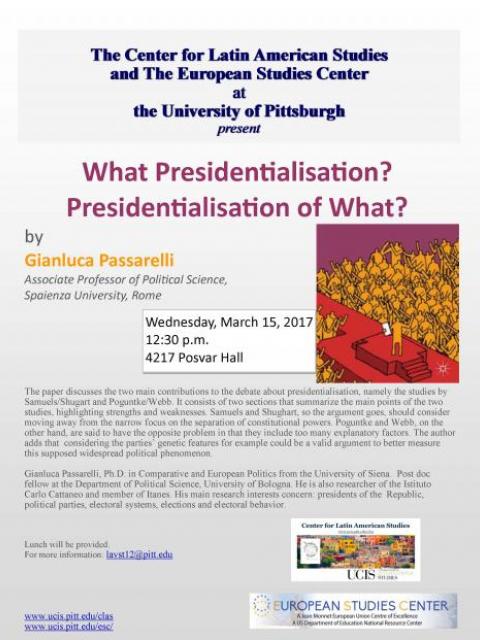
The paper discusses the two main contributions to the debate about presidentialisation, namely the studies by Samuels/Shugart and Poguntke/Webb. It consists of two sections that summarize the main points of the two studies, highlighting strengths and weaknesses. Samuels and Shughart, so the argument goes, should consider moving away from the narrow focus on the separation of constitutional powers. Poguntke and Webb, on the other hand, are said to have the opposite problem in that they include too many explanatory factors. The author adds that considering the parties’ genetic features for example could be a valid argument to better measure this supposed widespread political phenomenon.
Gianluca Passarelli, Ph.D. in Comparative and European Politics from the University of Siena. Post doc fellow at the Department of Political Science, University of Bologna. He is also researcher of the Istituto Carlo Cattaneo and member of Itanes. His main research interests concern: presidents of the Republic, political parties, electoral systems, elections and electoral behavior.
Lunch will be provided.
For more information: lavst12@pitt.edu
Wednesday, March 8th, 2017
The Euro Challenge is a national competition for cash prizes where 9th and 10th grade high school students test their knowledge and understanding of the European economy and the Euro, the currency shared by many of the 28 countries of the European Union.
Saturday, March 4th, 2017
French Immersion workshops offer area secondary school French teachers an opportunity to maintain or improve their language skills, to develop a deeper understanding of French culture and its global influence, and to share relevant teaching strategies. Act 48 credit is available. For more information and registration please contact Kathy Ayers, Outreach Coordinator.
Friday, March 3rd, 2017
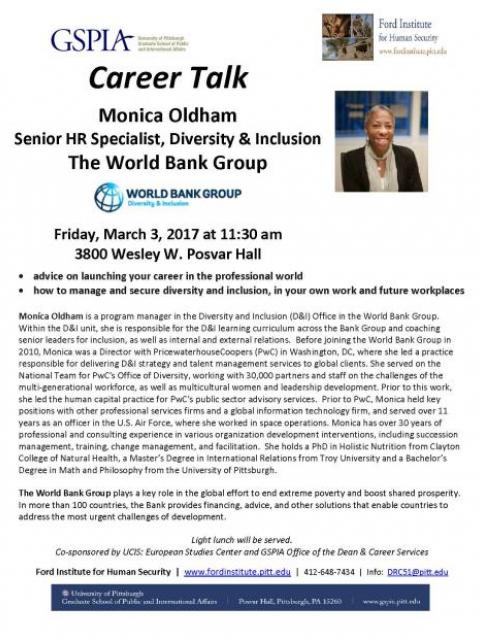
- Advice on launching your career in the professional world
- How to manage and secure diversity and inclusion, in your own work and future workplaces
Monica Oldham is a program manager in the Diversity and Inclusion (D&I) Office in the World Bank Group. Within the D&I unit, she is responsible for the D&I learning curriculum across the Bank Group and coaching senior leaders for inclusion, as well as internal and external relations. Before joining the World Bank Group in 2010, Monica was a Director with PricewaterhouseCoopers (PwC) in Washington, DC, where she led a practice responsible for delivering D&I strategy and talent management services to global clients. She served on the National Team for PwC's Office of Diversity, working with 30,000 partners and staff on the challenges of the multi-generational workforce, as well as multicultural women and leadership development. Prior to this work, she led the human capital practice for PwC's public sector advisory services. Prior to PwC, Monica held key positions with other professional services firms and a global information technology firm, and served over 11 years as an officer in the U.S. Air Force, where she worked in space operations. Monica has over 30 years of professional and consulting experience in various organization development interventions, including succession management, training, change management, and facilitation. She holds a PhD in Holistic Nutrition from Clayton College of Natural Health, a Master’s Degree in International Relations from Troy University and a Bachelor’s Degree in Math and Philosophy from the University of Pittsburgh.
The World Bank Group plays a key role in the global effort to end extreme poverty and boost shared prosperity. In more than 100 countries, the Bank provides financing, advice, and other solutions that enable countries to address the most urgent challenges of development.
Light lunch will be served.
Co-sponsored by UCIS: European Studies Center and GSPIA Office of the Dean & Career Services
Ford Institute for Human Security | www.fordinstitute.pitt.edu | 412-648-7434 | Info: DRC51@pitt.edu
Tuesday, February 28th, 2017
Come here two senior Netherlands Government officials explain the extensive Netherlands partnerships in the US, the post-Brexit EU, and the possible impacts of the upcoming Dutch parliamentary elections. After a brief introduction, Netherlands Consul General Dolph Hogewoning and Economics Minister Remco Zeeuw will field questions and a discussion with Pitt students and faculty.
Friday, February 24th, 2017 to Saturday, February 25th, 2017
The Undergraduate Model European Union is an annual event that gives students a chance to learn about the workings of the European Union through preparation for and participation in a hands-on two-day simulation. Model EU enhances students’ understanding of the issues and challenges facing the 28 member nations of the EU. Awards will be given to the most effective delegations and best individual position papers.
This year's competition will host universities from across the region and will take place on Duquesne University’s campus.
To register your school now to go: http://tinyurl.com/2017-UMEU.
Thursday, February 23rd, 2017
Tuesday, February 21st, 2017
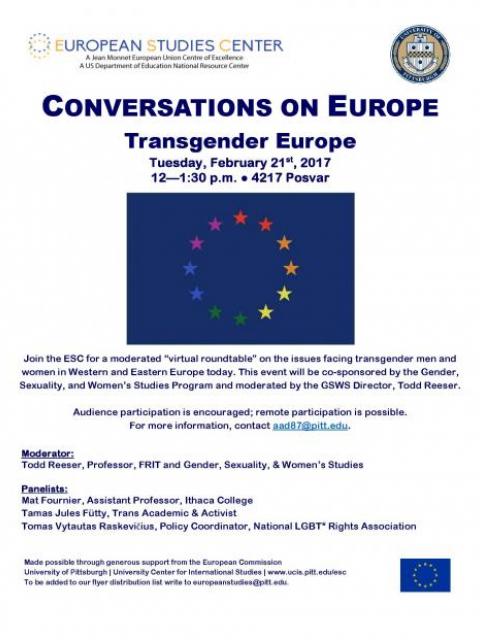
Thursday, February 16th, 2017
Join us for a lecture by Dr. Bernard Hagarty in conjunction with the exhibition, "The Great War in Broad Outlines."
Dr. Hagarty will discuss Belgium's critical role in WW1. Light refreshments will be served as attendees view the exhibition.
Saturday, February 11th, 2017
Join us for a good old-fashioned Teach-In to explore the various issues surrounding America First Immigration and Trade Policy this Saturday from 1-5 p.m. in the Cathedral of Learning.
The University Center for International Studies and its constituent centers are organizing a Teach-In on Saturday, February 11, 2017 from 1:00 p.m. to 5:00 p.m. The purpose of the Teach-In is to provide students and staff at the University of Pittsburgh with a forum to better understand the new administration’s Executive Orders related to immigration and national security, their historical context, their implications, and the public and global response to them. It will be open to all students, faculty, staff, and alumni of the University of Pittsburgh. Attendees will be able to select from a variety of presentations from Pitt faculty. Come and learn!
A full schedule will be posted as it becomes available.
Tuesday, February 7th, 2017 to Friday, February 17th, 2017

Join us for an exhibition sponsored by the Belgium Embassy entitled ‘The Great War in Great Outlines.'
The exhibition will be available on the 4th floor of Posvar Hall, M - F from 10 AM - 3:30 PM. The show will run from 2/7/17 - 2/17/17.
More on the exhibition from the Belgian Embassy:
In April 2017, the United States will commemorate the centenary of its engagement in WWI, and the sacrifice of American troops, notably on Belgian soil, during this awful global conflict. ‘The Great War in Broad Outlines’, a travelling exhibition presented by the Embassy of Belgium in the United States, tells the story of the Great War on the international, Belgian and local levels. Created by the National Institute for Veterans and Victims of War for the Ministry of Foreign Affairs and endorsed by the United States WWI Centennial Commission, ‘The Great War in Broad Outlines’ will be shown in Miami, Pittsburgh, Atlanta and Washington DC.
A view on the many faces of the Great War, ‘The Great War in Broad Outlines’ presents key moments and battles of WWI; how the American engagement changed the course of the war; occupied Belgium and The Commission for Relief in Belgium (American humanitarian response to the plight of civilians); technological and medical progress during the Great War; and also sheds light on a number of lesser known episodes and aspects of WWI (resistance, Belgians in Russia, animals in the war…).
The Embassy of Belgium would like to thank all the exhibition partners of ‘The Great War in Broad Outlines’, notably UPS.
Monday, January 30th, 2017
History as Politics: Coming to Terms with the Past in Post-Soviet Latvia (Geschichte als Politikum: Lettland und die Aufarbeitung nach der Diktatur) explores post-Communist Latvia, a restored independent state, which emerged from the ashes of the Soviet Union facing a range of challenges. The Soviet period had transformed the region, leaving sizeable Russian-speaking minorities in the Baltic states. As Latvia sought membership in the European Union and NATO, its treatment of national minorities came into the spotlight, viewed as inter-ethnic conflict by international observers. However, the book argues that at the core of the conflict were not so much ethnic tensions but instead diverging historical perceptions. Free speech and post-Soviet democratization unleashed conflicting historical narratives from the different ethnic groups, resulting in fierce debates about World War II and its aftermath.
The discussion of this book will be in English, and will feature commentary by:
John Connelly, University of California, Berkeley
Randall Halle, University of Pittsburgh
Reception to follow.
Wednesday, January 25th, 2017 to Tuesday, January 31st, 2017
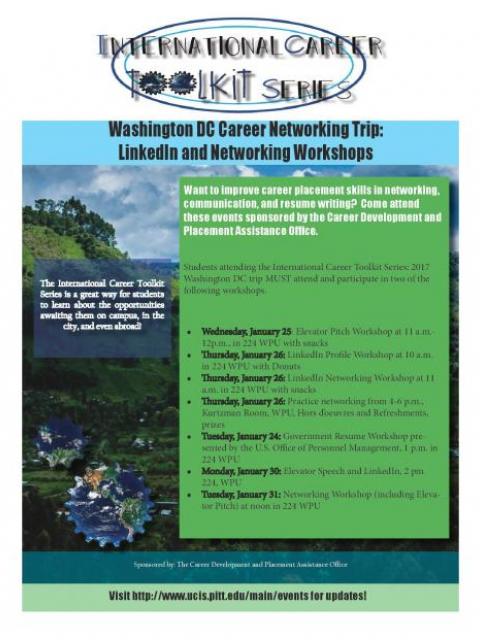
Want to improve career placement skills in networking, communication, and resume writing? Come attend these events sponsored by the Career Development and Placement Assistance Office.
Tuesday, January 24, Government Resume Workshop presented by the U.S. Office of Personnel Management, 1 p.m. in 224 WPU
Wednesday, January 25: Elevator Pitch Workshop at 11 a.m.-12p.m., in 224 WPU with snacks
Thursday, January 26: LinkedIn Profile Workshop at 10 a.m. in 224 WPU with Donuts
Thursday, January 26: LinkedIn Networking Workshop at 11 a.m. in 224 WPU with snack
Thursday, January 26: Practice networking from 4-6 p.m., Kurtzman Room, WPU, Hors d’oeuvres and Refreshments, prizes
Monday, January 30, Elevator Speech and LinkedIn, 2 pm 224, WPU
Tuesday, January 31, Networking Workshop (including Elevator Pitch) at noon in 224 WPU
Students attending the International Career Toolkit Series: 2017 Washington DC trip MUST attend and participate in two of the following workshops.
Tuesday, January 17th, 2017
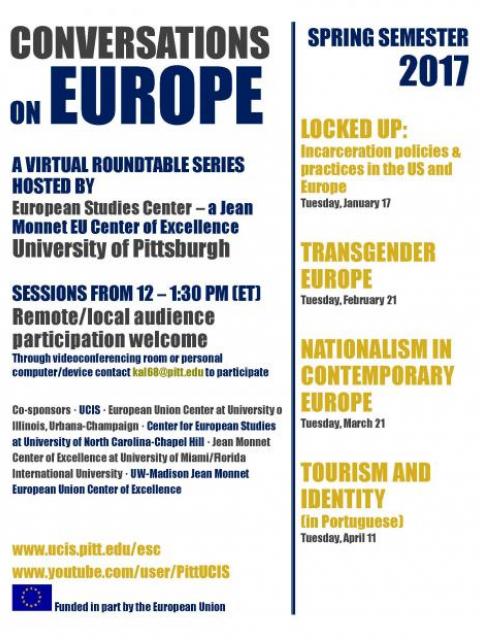
Have we entered a new age of cyber-sabotage? In this session of Conversations on Europe, our expert panel will explore episodes of foreign state interference in electoral politics in Europe and the U.S. past and present. From state-sponsored hacking to Wikileaks, what do we know about who is calling the shots? How have disinformation campaigns been used to meddle in domestic politics in countries throughout eastern and western Europe, and to what effect? For more information or to join remotely, contact Ashley Digregorio: aad87@pitt.edu.
This one is co-sponsored by the Center for Russian and East European Studies.
Moderator:
Allyson Delnore, Interim Director, European Studies Center
Panelists:
John R. Deni, Research Professor of National Security Studies, Gen. Douglas MacArthur Chair of Research, Strategic Studies Institute
Florian Hartleb, Independent Scholar and Consultant, E-Estonia and digitization
Helga Druxes, Professor, Williams College
William Dunn, Professor, GSPIA
Sean Guillory, Blogger and Podcaster, Center for Russian and East European Studies Affiliate
Tuesday, January 17th, 2017 to Wednesday, January 18th, 2017
It couldn't be easier to get your new US Passport or to renew your old Passport at Pitt! Book an appointment online today at www.ucis.pitt.edu/get-a-passport so that you can get started on your next adventure abroad!
Friday, January 13th, 2017
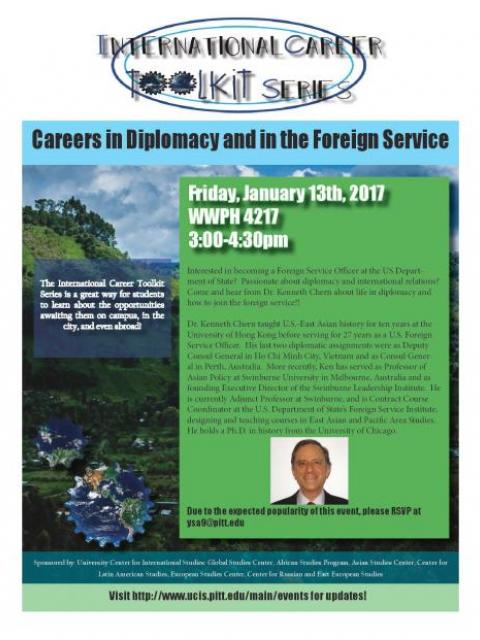
Interested in becoming a Foreign Service Officer at the US Department of State? Passionate about diplomacy and international relations? Come and hear from Dr. Kenneth Chern about life in diplomacy and how to join the foreign service as part of our International Career Toolkit Series.
Dr. Kenneth Chern taught U.S.-East Asian history for ten years at the University of Hong Kong before serving for 27 years as a U.S. Foreign Service Officer. His last two diplomatic assignments were as Deputy Consul General in Ho Chi Minh City, Vietnam and as Consul General in Perth, Australia. More recently, Ken has served as Professor of Asian Policy at Swinburne University in Melbourne, Australia and as founding Executive Director of the Swinburne Leadership Institute. He is currently Adjunct Professor at Swinburne, and is Contract Course Coordinator at the U.S. Department of State’s Foreign Service Institute, designing and teaching courses in East Asian and Pacific Area Studies. He holds a Ph.D. in history from the University of Chicago.
Due to the expected popularity of this event, please RSVP at ysa9@pitt.edu!
Friday, December 16th, 2016
Friends of the European Studies Center are welcome to join our staff at the Frick for the December 16th Winter Fridays at the Frick. We've teamed with the Frick to celebrate the holidays and brighten this special time of year.
The Frick will have strolling carolers, warm beverages, holiday cookie decorating, free performances, and much more!
On the ESC's Winter Friday evenings at the Frick . . .
Let us warm your spirits at the Frick Holiday Bar. Enjoy seasonal beers, wine or cocktails with friends—or have a cup of warm cider while enjoying beautiful views of the grounds. Find our table to receive your drink ticket (free to friends of the Center) - while supplies last. View the regular collection - The Frick Collects: From Rubens to Monet to get your dose of European art for the season (free).
Decorate holiday cookies in the Community Room.
Visit Clayton for a special Family Christmas tour of the Frick family home (free to Frick members - all others charged a fee).
Create your own holiday memory exploring the grounds with your friends at the European Studies Center, enjoying the sounds of Holiday Harmonies, strolling carolers from 6:00 – 8:00 p.m.
And don’t forget to visit the Frick Museum Store, where finding that perfect unique holiday gift is easy!
COSTS:
Admission to the Frick grounds for everyone—FREE
Admission to The Frick Collects: From Rubens to Monet—FREE
Friday, December 9th, 2016
The High School Model European Union is an annual event for area high school students. The goal of the Model EU is to give high school students a chance to learn about the workings of the European Union through a hands-on simulation. Playing the roles of presidents and prime ministers, students spend a day engaged in intense negotiations over conflicting issue about the EU. The objective is to simulate a specific European Council meeting that focuses on recent current events impacting the EU. Model EU enhances students’ understanding of classroom learning and gives them a real sense of the challenges involved in the decision-making process of the European Union.
To register your school now go to: http://tinyurl.com/2016-HSMEU.
Tuesday, December 6th, 2016
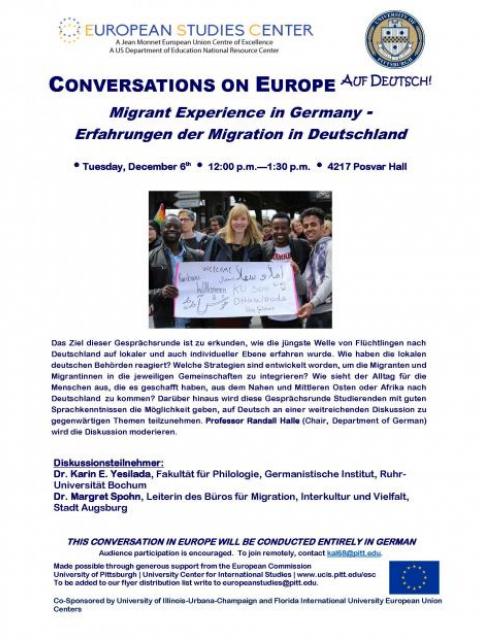
What has been described in the media as a migration crisis in Europe is being characterized by many aid workers as a reception crisis. The German Chancellor, Angela Merkel, has taken the lead among European heads of state in advocating for a safe and effective process of resettling migrants. Taking Germany as an example, our panel of experts will discuss the migrant experience in that country. What are the legal processes for applying for asylum or settling as an economic migrant? What is the pathway to citizenship? What has been the public response? How does Germany's experience compare with other European countries? Randall Halle, Chair of the German Department, will moderate the discussion which will be conducted entirely in German by native-level speakers. Audience participation is welcome. To join remotely, contact kal68@pitt.edu.
Monday, December 5th, 2016
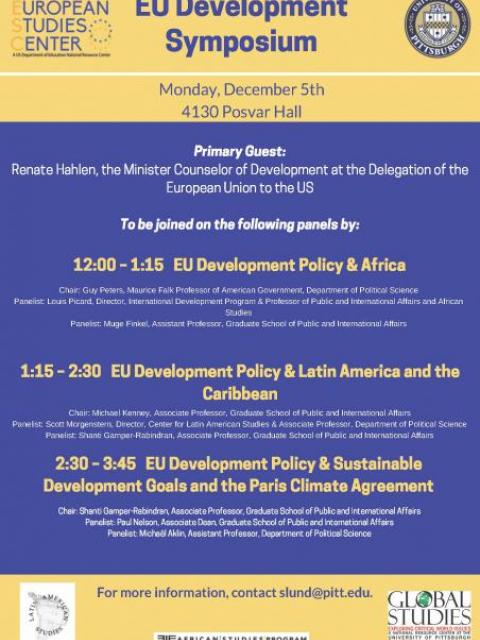
Save the date for the EU Development Symposium, to be held on the afternoon of Monday, December 5th!
Primary Guest:
Renate Hahlen, the Minister Counselor of Development at the Delegation of the European Union to the US
To be accompanied on the following panels by:
EU Development Policy & Latin America and the Caribbean
Scott Morgenstern, Director Center for Latin American Studies, Associate Professor, Department of Political Science
EU Development Policy & Africa
Louis Picard, Director International Development Program and Professor of Public and International Affairs and African Studies
Müge Finkel, Assistant Professor, GSPIA
Guy Peters, Maurice Falk Professor of American Government
EU Development Policy & Sustainable Development Goals
and the Paris climate agreement
Paul Nelson, Associate Dean, GSPIA
Michaël Aklin, Assistant Professor, Department of Political Science
Additional participants and final times to be announced. For more information, contact Stephen Lund at slund@pitt.edu.
Friday, December 2nd, 2016
Organized by Giuseppina Mecchia and Francesca Savoia (French and Italian)
With the support of: The European Studies Center, The Humanities Center, The World History Center, The Graduate Program for Cultural Studies, The Department of English, The Department of French and Italian.
Discussant Presentations
Jenna Berardino (Italian)
Brendan Ezvan
(French)
Jonathan Arac
(English)
John Lyons
(German)
Jonathan Platt
(Russian)
General Discussion
Reception
Made Possible by The Students in Our Seminars
French:
Matt Blair
Brendan Ezvan
Phoebe Marshall
Patoimbasba Nikiema
Italian:
Jenna Berardino
Eleonora Carboni
Donatella D’Aguanno
Cinzia Delfini
Chiara Montera